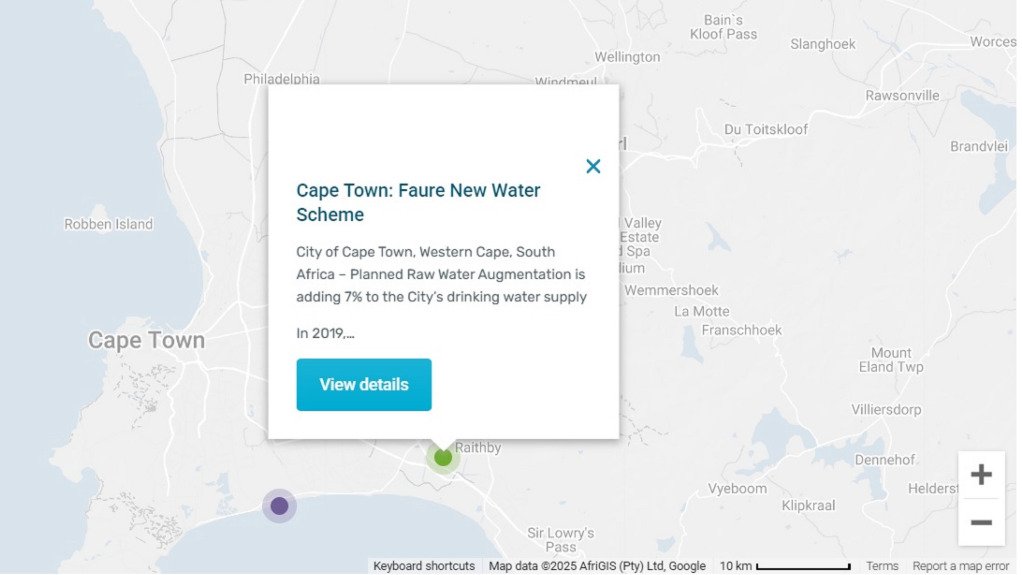Three Cape Town water supply schemes added to Global Connections Map
Three of the City of Cape Town’s water reuse schemes have been added to the Global Connections Map, which is deemed to be the largest online data-map that showcases water reuse projects.
The interactive online tool, compiled by the Water Services Association of Australia in partnership with the US-based WaterReuse Association, highlights locations where 100 drinking water reuse schemes are situated worldwide.
The Atlantis water resource management scheme, the Cape Flats managed aquifer recharge scheme and the Faure new water scheme made the list in December 2024.
There are currently 35 cities where water reuse projects, either planned, built or already in operation, are plotted, illustrating how several international communities now rely on water reuse, as part of their strategy to sustain drinking water supply, said City of Cape Town Water and Sanitation MMC Councillor Zahid Badroodien.
“Cape Town is not alone in its efforts to augment water supply through alternative sources. Globally, purified recycled water is already part of the drinking water system for 30-million people.”
Implementing potable water reuse means that wastewater will be treated through an advanced water purification process until it can be safely used again for drinking.
The City of Cape Town, in an effort to secure enough drinking water in the supply network, has been exploring this method combined with other water sources.
“Cape Town is investing more in infrastructure than Johannesburg and Durban combined, with a capital budget 91% larger than Joburg and 117% larger than eThekwini over the next three years,” he said, adding that water and sanitation represents 42% of the city’s R120-billion, ten-year infrastructure pipeline, funding critical projects from its New Water Programme.
The New Water Programme is a strategic response to Cape Town’s increasing water needs and climate variability, and by introducing multiple water sources, the programme aims to add 300-million litres a day to the city’s water supply by 2030.
The key initiatives include water reuse, desalination, the clearing of invasive plant species and groundwater abstraction.
The planned Faure new water scheme, which is currently in the design stage, is a direct potable reuse scheme that will produce 70-million litres a day – upgradable to 100-million litres a day – of drinking water.
According to Badroodien, the scheme will convert highly purified source water from Zandvliet wastewater treatment works into safe drinking water that meets international quality standards.
This requires an advanced water purification process involving multiple technological barriers, such as ozonation, biologically-activated carbon filtration, granular-activated carbon filtration, ultrafiltration, UV advanced oxidation and disinfection.
Once purified, the water will then be blended with dam water and treated again at the existing Faure water treatment plant, before being distributed through the city's drinking water supply network.
Public participation on outsourcing the implementation and operation of the facility starts in March 2025.
The operating Atlantis water resource management scheme is a ground water scheme that includes a managed aquifer recharge component.
“The managed aquifer recharge includes the infiltration of conditioned stormwater and treated effluent into strategic zones of the aquifer, to ensure sustainability of the aquifer biome over the long term.”
The Atlantis scheme, which currently produces 13-million litres a day, is being optimised to produce 25-million litres a day in the medium-term, with the long-term potential of being expanded to produce 40-million litres a day.
The Cape Flats managed aquifer recharge, which is under construction and is a component of the Cape Flats aquifer management scheme, includes the abstraction of groundwater from the Cape Flats aquifer and the managed aquifer recharge component. It comprises the injection of treated effluent into the strategic zones of the aquifer.
This scheme is expected to produce 54-million litres a day of drinking water.
Meanwhile, under the New Water Programme, the Paarden Eiland desalination plant, currently in the planning phase, will use multi-barrier treatment technology to remove pollutants and salts, ensuring the production of high-quality drinking water.
“The city launched a public participation process on January 31, on outsourcing the implementation and operation of the facility, with feedback submissions open until March 3.”
Also part of the programme is the extensive clearing of invasive plant species, which is a cost-effective way to free up billions of litres of water in Cape Town’s key catchment areas.
“The removal of non-indigenous, water-guzzling plants is an important component of the city's Water Strategy and long-term New Water Programme, which aims to add 55-billion litres a year to the water network.”
In terms of groundwater abstraction, the City of Cape Town is tapping into aquifers to secure over 100-million litres a day of water.
Article Enquiry
Email Article
Save Article
Feedback
To advertise email advertising@creamermedia.co.za or click here
Press Office
Announcements
What's On
Subscribe to improve your user experience...
Option 1 (equivalent of R125 a month):
Receive a weekly copy of Creamer Media's Engineering News & Mining Weekly magazine
(print copy for those in South Africa and e-magazine for those outside of South Africa)
Receive daily email newsletters
Access to full search results
Access archive of magazine back copies
Access to Projects in Progress
Access to ONE Research Report of your choice in PDF format
Option 2 (equivalent of R375 a month):
All benefits from Option 1
PLUS
Access to Creamer Media's Research Channel Africa for ALL Research Reports, in PDF format, on various industrial and mining sectors
including Electricity; Water; Energy Transition; Hydrogen; Roads, Rail and Ports; Coal; Gold; Platinum; Battery Metals; etc.
Already a subscriber?
Forgotten your password?
Receive weekly copy of Creamer Media's Engineering News & Mining Weekly magazine (print copy for those in South Africa and e-magazine for those outside of South Africa)
➕
Recieve daily email newsletters
➕
Access to full search results
➕
Access archive of magazine back copies
➕
Access to Projects in Progress
➕
Access to ONE Research Report of your choice in PDF format
RESEARCH CHANNEL AFRICA
R4500 (equivalent of R375 a month)
SUBSCRIBEAll benefits from Option 1
➕
Access to Creamer Media's Research Channel Africa for ALL Research Reports on various industrial and mining sectors, in PDF format, including on:
Electricity
➕
Water
➕
Energy Transition
➕
Hydrogen
➕
Roads, Rail and Ports
➕
Coal
➕
Gold
➕
Platinum
➕
Battery Metals
➕
etc.
Receive all benefits from Option 1 or Option 2 delivered to numerous people at your company
➕
Multiple User names and Passwords for simultaneous log-ins
➕
Intranet integration access to all in your organisation





















